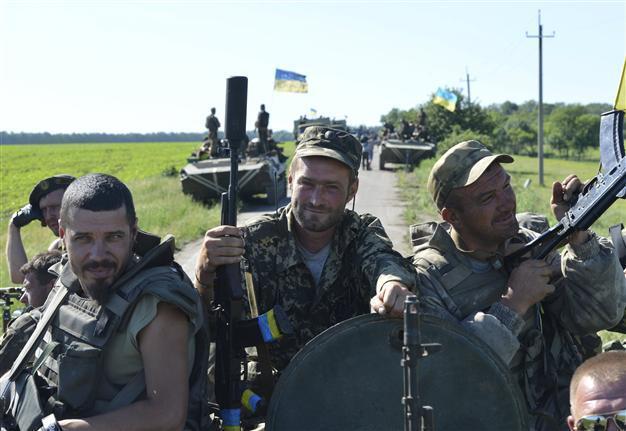Poll: Americans and Europeans differ on aid to Ukraine
MOSCOW - The Associated Press

Members of the Ukrainian armed forces pose for a picture as they gather on an armoured vehicle on the roadside near the village of Vidrodzhennya outside Artemivsk, Donetsk region, Ukraine, June 9, 2015. Reuters Photo
A new survey shows that Americans are less willing than Europeans to send economic aid to Ukraine, where the government is struggling to keep the economy afloat while battling Russian-backed separatists.At the same time, Americans would be more willing than Europeans to use military force against Russia if it were to attack a neighboring country that was a member of NATO, according to the survey released early June 10 by the Pew Research Center.
While Ukraine is not a NATO member, other former Soviet republics are and they worry that the Western alliance would not defend them if it meant military confrontation with Russia.
The survey examined public opinion in eight NATO countries: the United States, Britain, Canada, France, Germany, Italy, Poland and Spain. The interviews were conducted in April and May among about 1,000 adults in each country, with margins of error ranging from plus or minus 3.4 to 4.1 percentage points.
Of the eight countries, only Italy was less supportive of sending economic aid to Ukraine than the US, where 62 percent of those surveyed were in favor. Support was highest in Poland and Spain, at 77 percent.
But when asked whether NATO should send arms to Ukraine, the US and Poland were most in favor, at 46 percent and 50 percent, respectively. Germany was at the bottom of the pack with only 19 percent support.
Americans and Germans were also at opposite ends on the question of whether their country should use military force to defend a NATO ally if it were attacked by Russia. In the US, 56 percent surveyed said yes, while in Germany only 38 percent said they would support military action.
In Italy and Poland, the interviews were conducted face-to-face; in the other six countries they were done over the telephone, on land lines and cell phones.
















